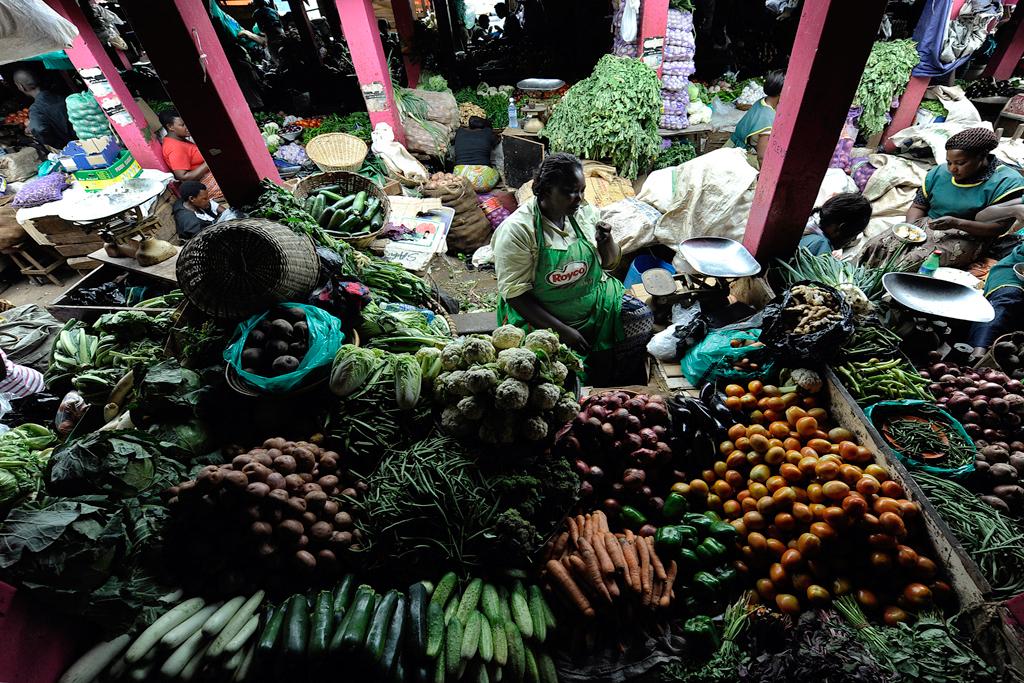Opinion: EU gets taste of its own medicine
A vendor sells fruits and vegetables at Nakasero market on May 14, 2011 in central Kampala, Uganda.
WASHINGTON — As hospitals across Europe deal with rising cases and deaths caused by the recent E-coli outbreak, Russia announced a ban of all imported fresh vegetables from the European Union in an effort to avoid a similar outbreak. Russia ostensibly hopes to protect the health of its citizens, but this trade restriction has outraged the EU, calling the move "disproportionate." Some African farmers and public health officials however may look at this spat no small amount of satisfaction. The EU is now getting its comeuppance after trade rules brought about the end of an effective malaria control program.
In 2008 the Ugandan government, with support from the United States, embarked on a malaria control program using the public health insecticide DDT. This insecticide is sprayed inside houses where it repels and also kills the deadly malarial mosquitoes. While the program rapidly reduced malaria cases and deaths, it was brought to an abrupt halt because local agricultural producers feared their exports of produce would be rejected by the EU. The episode highlights the often absurd and unjust way in which the EU’s sanitary and phytosanitary rules, to say little of their generous domestic agricultural subsidies, restrict trade.
For malaria control DDT is not sprayed outdoors, so there should be no substantial residues of the insecticide on crops. But Uganda’s many small-scale farmers store their produce in sacks inside houses that may have been sprayed with DDT. There is, therefore, a small chance that some tiny amounts of the insecticide could end up on goods intended for export. Indeed a survey by the contractor that undertook the 2008 spraying program found some residues of DDT on samples of coffee stored inside sprayed houses.
EU trade rules allow maximum residues of DDT on produce of 0.05mg/kg, which amounts to zero tolerance. The concentrations of DDT found on about half the samples of coffee ranged between 0.011 and 0.26 mg/kg.
Had this coffee been exported to the EU, what would the health risk to European cappuccino drinkers have been?
Based on calculations that I undertook with a leading public health scientist, we estimate that the DDT consumed would have been 12,000 times below the no observable effect level (NOEL). The NOEL is established based on long-term experiments in which humans ingested DDT following which observations were made to determine any human health effects. Essentially there would have been zero impact on coffee drinkers, indeed the naturally occurring carcinogens in the coffee would have been of far greater concern.
Yet so pervasive is the fear of man-made chemicals and DDT in particular that EU trade rules shut down a highly successful malaria control program, costing African lives in the process.
For the EU to claim now that Russia’s ban on fresh vegetables is disproportionate is a bit rich. The lethal E-coli strain is in fact a very real threat to human lives. With DDT, despite thousands of studies over many decades, there is no evidence complying with the most basic epidemiologic criteria to prove a cause and effect relationship that shows that this insecticide is a cause of actual harm to human health.
To demonstrate how ridiculous the situation has become, one of the greatest opponents of DDT use in Uganda was the tobacco industry. Fearful that any DDT residues to tarnish their product, cigarette manufacturers came out front and center against DDT. DDT has never been proven to cause any human cancers. On the other hand it has been rigorously proven that tobacco causes many cancers as well as a host of other ailments. We should actually be more concerned about tobacco residues on the DDT.
Most insect-borne diseases were eradicated from the EU decades ago, thanks in part to DDT spraying. Since then perceptions of risk from EU consumers have become skewed. Consumers clinging to the idea that organic food is somehow safer and better may be troubled to learn that the latest reports indicate the E-coli outbreak probably came from sprouts grown on an organic farm. So entrenched is the idea that natural is ‘good’ and man-made is ‘bad’ that there is an apparent willingness to sacrifice human lives far away in return for the mirage of chemical safety at home.
Let’s hope the banning of EU vegetables causes European to think long and hard about the impact of their trade policies on the world’s poor. In the interim, let’s also hope that canny Ugandan farmers are able to step in and sell their delicious, and safe, fruits and vegetables to Russian consumers.
Richard Tren is Executive Director of Africa Fighting Malaria, a health advocacy group based in Washington DC and Durban, South Africa.
We want to hear your feedback so we can keep improving our website, theworld.org. Please fill out this quick survey and let us know your thoughts (your answers will be anonymous). Thanks for your time!
